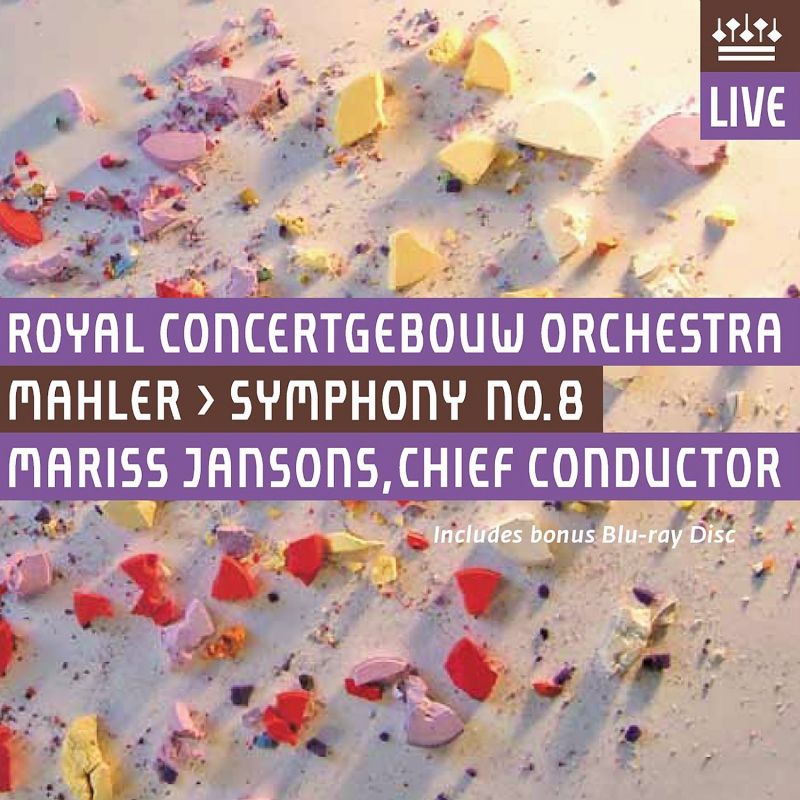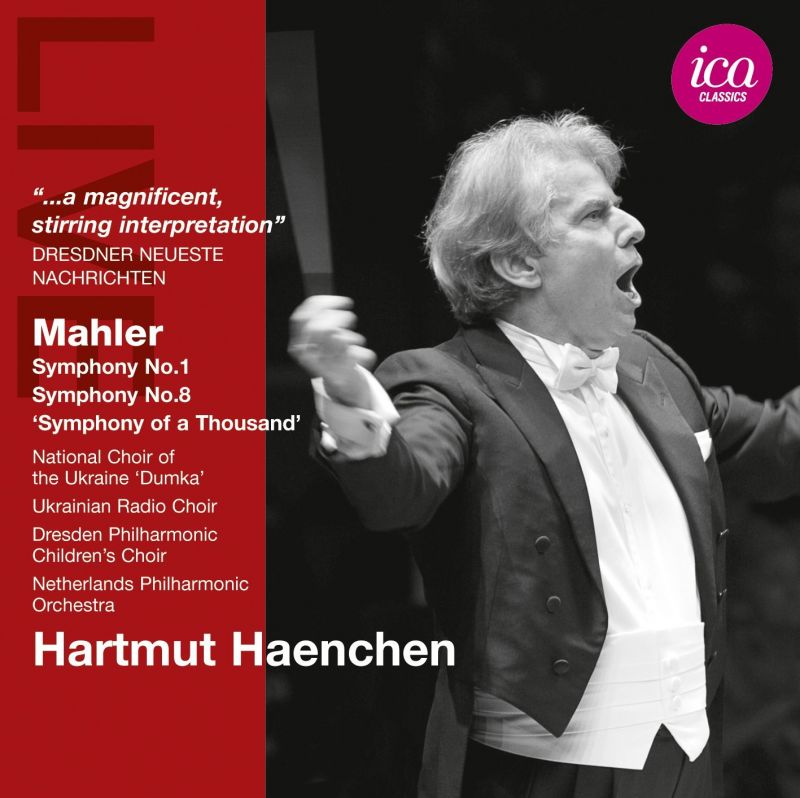MAHLER Symphony No 8
Mahler Eighths from Amsterdam under Jansons and Haenchen
View record and artist detailsRecord and Artist Details
Composer or Director: Gustav Mahler
Genre:
Orchestral
Label: RCO Live
Magazine Review Date: 09/2013
Media Format: Super Audio CD
Media Runtime: 80
Mastering:
DDD
Catalogue Number: RCO13002

Tracks:
| Composition | Artist Credit |
|---|---|
| Symphony No. 8, 'Symphony of a Thousand' |
Gustav Mahler, Composer
Bavarian Radio Chorus Camilla Nylund, Soprano Christine Brewer, Soprano Gustav Mahler, Composer Latvija State Choir María Espada, Soprano Mariss Jansons, Conductor Mihoko Fujimura, Mezzo soprano National Boy's Choir National Children's Choir Netherlands Radio Choir Robert Dean Smith, Tenor Royal Concertgebouw Orchestra, Amsterdam (members of) Stefan Kocán, Bass Stephanie Blythe, Mezzo soprano Tommi Hakala, Baritone |
Composer or Director: Gustav Mahler
Genre:
Orchestral
Label: ICA Classics
Magazine Review Date: 09/2013
Media Format: CD or Download
Media Runtime: 135
Mastering:
ADD
Catalogue Number: ICAC5094

Tracks:
| Composition | Artist Credit |
|---|---|
| Symphony No. 1 |
Gustav Mahler, Composer
Gustav Mahler, Composer Hartmut Haenchen, Conductor Netherlands Philharmonic Orchestra |
| Symphony No. 8, 'Symphony of a Thousand' |
Gustav Mahler, Composer
Angela Maria Blasi, Soprano Catherine Keen, Mezzo soprano Dresden Boy's Choir Dresden Philharmonic Chorus (Children's Voices) Glenn Winslade, Tenor Gustav Mahler, Composer Hartmut Haenchen, Conductor John Bröcheler, Baritone Kurt Rydl, Bass National Academic Choir of Ukraine 'Dumka' Netherlands Philharmonic Orchestra Ofelia Sala, Soprano Reinhild Runkel, Mezzo soprano Rita Cullis, Soprano Ukrainian Radio Choir |
Author: Edward Seckerson
The warmth of the RCO Live recording for Jansons (and the bonus audiovisual DVD which accompanies it) is a factor, of course. Technology has come on in the decade since the Haenchen was recorded. But, characteristically, Jansons is more alive to the work’s animation than Haenchen. The thrust of a true symphonic allegro is pointedly implied (if not actually realised) in the opening ‘Veni, Creator Spiritus’ setting with rhythm and momentum always a priority and, in the great central development, a keen ear for the orchestral exclamations and that way Mahler has of making high clarinets the cutting edge of his wind band. In short, Jansons keeps the music moving and gives himself something to pull back from in the biggest tuttis. The final moments in the approach to the recapitulation of the opening statement are truly thrilling – a great welter of sound. Likewise the switch from the jaunty uplift of the ‘Gloria Patri Domino’ into what can only be described as the ‘expensive’ moment where Jansons effects a Bernsteinesque expansiveness. And he has a shining Christine Brewer as his first soprano popping those top Bs and Cs above the stave.
Haenchen is merely monolithic – and that’s surprising given his spirited and volatile, if somewhat Germanic, account of the First Symphony which is his coupling. A much broader tempo for Part 1 (and indeed Part 2) is about size and size alone, it would seem – a sense of going nowhere – and not even the words ‘Accende lumen sensibus’ at the start of the development can spur it on. As with so many performances of this piece, it feels like sheer numbers are weighing it down. The resolution of this first part is strenuous, to say the least. Jansons, by contrast, has those choral entries across the last two pages going off like comets.
Jansons really comes into his own in Part 2. The Adagio introduction feels spiritual as opposed to merely intense; and once we’re into the celestial operatics, a special atmosphere is born of clean air and buoyant voices. The Mater Gloriosa moment (a purple moment in the wrong hands) is pure and absolutely unsentimental, with harmonium magically ‘present’. Haenchen is so slow here as to be shapeless – indeed, there is not too much sweetness and light in his Heaven, rather an all-pervasive heaviness.
Jansons’s soloists are generally better, too, with only his bass, Stefan Kocán (Pater Profundus) a touch occluded. Haenchen has the gruff, Hagen-like Kurt Rydl but sadly past his best. Robert Dean Smith is Jansons’s tenor, transcending the cruelly high tessitura to find the beauty and ecstasy in Doctor Marianus. Haenchen’s Glenn Winslade too often sounds at the limit of his possibilities, an accident waiting to happen.
But this piece is ultimately about Love, and and in that lofty solo for the second soprano (Una Poenitentium) where Gretchen recalls Faust, her one true love, in a phrase which Mahler will emblazon across solo brass at the the peak of the Chorus Mysticus, Camilla Nylund (Jansons) and Angela Maria Blasi (Haenchen) both, but especially Blasi, rise to the intensity of the moment.
Surely Jansons could have achieved a quieter pianissimo at the start of the Chorus Mysticus? And what of that strange anomaly (an error?) in the score where the altos are tied over in the bar before the all-out fortissimo at ‘Alles Vergängliche’? Jansons makes a point of it; Haenchen, like most, ignores it altogether and opts for a clean attack. There are more momentous endings than either of these on disc but Jansons, with so much else going for him, is up there among the select front-runners.
Discover the world's largest classical music catalogue with Presto Music.

Gramophone Digital Club
- Digital Edition
- Digital Archive
- Reviews Database
- Full website access
From £8.75 / month
Subscribe
Gramophone Full Club
- Print Edition
- Digital Edition
- Digital Archive
- Reviews Database
- Full website access
From £11.00 / month
Subscribe
If you are a library, university or other organisation that would be interested in an institutional subscription to Gramophone please click here for further information.




